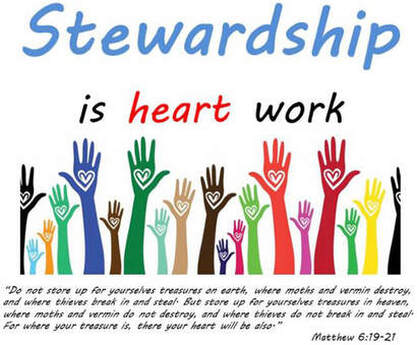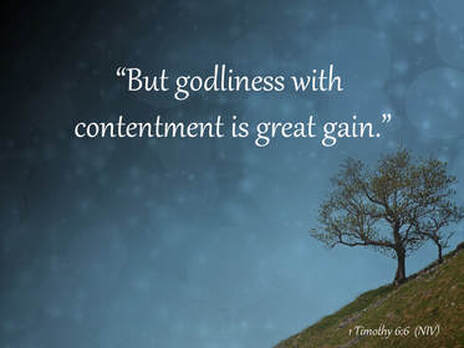A Steward Is A Manager
Often, stewardship is thought of only in terms of finances, but the Bible teaches that stewardship is a far greater concept, involving how we respond with all of our lives to Him who is the giver and sustainer of life?
Christian stewardship goes much deeper, it is far more inclusive. The New Testament concept of stewardship centers in our commitment to Jesus Christ. When He becomes our Lord, He becomes Lord of our time, talents, finances, and everything. We realize that we are not our own, but we are bought with a price.
1 Corinthians 6:19-20 NIV Do you not know that your bodies are temples of the Holy Spirit, who is in you, whom you have received from God? You are not your own; you were bought at a price. Therefore honor God with your bodies.
There are four important principles about biblical stewardship we need to understand:
1. The principle of ownership
Psalms 24:1-2 NIV The earth is the Lord ’s, and everything in it, the world, and all who live in it; for he founded it on the seas and established it on the waters.
As the Creator, God has absolute rights of ownership over all things.By right of creation, the entire earth is God's; and everything and everyone on the earth are also within his sovereignty.
2. The principle of responsibility.
1 Timothy 6:17 NIV Command those who are rich in this present world not to be arrogant nor to put their hope in wealth, which is so uncertain, but to put their hope in God, who richly provides us with everything for our enjoyment.
We are called as God’s stewards to manage that which belongs to God. While God has graciously entrusted us with the care, development, and enjoyment of everything he owns as his stewards, we are responsible to manage his holdings well and according to his desires and purposes.
3. The principle of accountability.
Matthew 25:14-30 NIV “Again, it will be like a man going on a journey, who called his servants and entrusted his wealth to them. To one he gave five bags of gold, to another two bags, and to another one bag, each according to his ability. Then he went on his journey. The man who had received five bags of gold went at once and put his money to work and gained five bags more. So also, the one with two bags of gold gained two more. But the man who had received one bag went off, dug a hole in the ground and hid his master’s money. “After a long time the master of those servants returned and settled accounts with them. The man who had received five bags of gold brought the other five. ‘Master,’ he said, ‘you entrusted me with five bags of gold. See, I have gained five more.’ “His master replied, ‘Well done, good and faithful servant! You have been faithful with a few things; I will put you in charge of many things. Come and share your master’s happiness!’ “The man with two bags of gold also came. ‘Master,’ he said, ‘you entrusted me with two bags of gold; see, I have gained two more.’ “His master replied, ‘Well done, good and faithful servant! You have been faithful with a few things; I will put you in charge of many things. Come and share your master’s happiness!’ “Then the man who had received one bag of gold came. ‘Master,’ he said, ‘I knew that you are a hard man, harvesting where you have not sown and gathering where you have not scattered seed. So I was afraid and went out and hid your gold in the ground. See, here is what belongs to you.’ “His master replied, ‘You wicked, lazy servant! So you knew that I harvest where I have not sown and gather where I have not scattered seed? Well then, you should have put my money on deposit with the bankers, so that when I returned I would have received it back with interest. “ ‘So take the bag of gold from him and give it to the one who has ten bags. For whoever has will be given more, and they will have an abundance. Whoever does not have, even what they have will be taken from them. And throw that worthless servant outside, into the darkness, where there will be weeping and gnashing of teeth.’
God has entrusted authority over the creation to us and we are not allowed to rule over it as we see fit. We are called to exercise our dominion under the watchful eye of the Creator managing his creation in accord with the principles he has established. We will all give account to the rightful owner as to how well we managed the things he has entrusted to us.
4. The principle of reward.
Colossians 3:23-24 NIV Whatever you do, work at it with all your heart, as working for the Lord, not for human masters, since you know that you will receive an inheritance from the Lord as a reward. It is the Lord Christ you are serving.
2 Corinthians 5:6, 8-10 NIV Therefore we are always confident and know that as long as we are at home in the body we are away from the Lord. We are confident, I say, and would prefer to be away from the body and at home with the Lord. So we make it our goal to please him, whether we are at home in the body or away from it. For we must all appear before the judgment seat of Christ, so that each of us may receive what is due us for the things done while in the body, whether good or bad.
The Bible shows us that faithful stewards who do the master’s will with the master’s resources can expect to be rewarded incompletely in this life, but fully in the next.
We all should long to hear the master say
‘Well done, good and faithful servant! You have been faithful with a few things; I will put you in charge of many things. Come and share your master’s happiness!’

By Rick Warren
“There is great gain in godliness combined with contentment; for we brought nothing into the world, so that we can take nothing out of it” (1 Timothy 6:6-7 NRSV).
God is more interested in your character than your comfort. He’s not going to give you things if you haven’t learned the principle of contentment first.
Contentment is not a lack of ambition. It’s not a lack of goals. Contentment means your happiness doesn’t depend on your circumstances.
How do you eliminate discontent? You eliminate the cause: comparing. We compare everything in this country—lawns, cars, husbands and wives, clothes, the education of our kids (we even put “My Kid Was Student of the Month” on car bumpers).
Whenever you compare, you’re going to become discontent. You’ve got to learn to stop comparing yourself to others.
Paul says in Philippians 4:12, “I know what it is to be in need, and I know what it is to have plenty. I have learned the secret of being content in any and every situation” (NIV). Contentment does not come naturally; it is something we have to learn. If we do this, God promises to meet all our financial needs.
The Bible says, “There is great gain in godliness combined with contentment; for we brought nothing into the world, so that we can take nothing out of it” (1 Timothy 6:6-7 NRSV).
One of the greatest secrets in learning to be content is to realize that you don’t really own anything. It’s all on loan to you for a few decades! You didn’t bring a single thing into this world, and you’re not going to carry anything out of it, either. You just get to use it while you’re here on earth.
The Bible calls that stewardship. You are the manager or steward of what God allows you to have while you’re here, but it’s not really yours. When you understand that you’re just a manager of the blessings God allows in your life and you hold them with an open hand, you won’t be uptight about losing them.
So what if you lose things? God can turn off one faucet and turn on another just as easily. Learn to be content because things don’t last. God is more interested in your character than your comfort.
The ultimate question, then, is this: Am I the lord of my life, or is Christ the Lord of my life? In essence, stewardship expresses our total obedience to God and our Lord and Savior, Jesus Christ.
As Creator he owns it all; but in his sovereign purpose, he chose to give people freedom to be his stewards or his enemies. What kind of steward are you?
Lord, I surrender my life to you. I want to do something, to make something happen, all on my own strength, but I know without you I can do nothing. I know my life is not my own, it is yours to work through me. Lord, I am grateful for this life you’ve given me. You’ve blessed me with different gifts and talents. Help me understand how to cultivate those things to bring glory to your great name. Amen.

 RSS Feed
RSS Feed